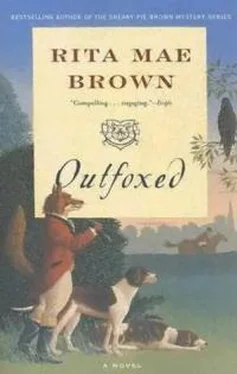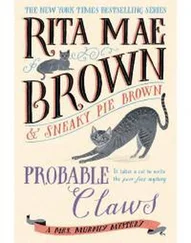DOG FOX—The male fox.
DOG HOUND—The male hound.
DOUBLE—A series of short, sharp notes blown on the horn to alert all that a fox is afoot. The “gone away” series of notes are a form of doubling the horn.
DRAFT—To acquire hounds from another hunt is to draft them.
DRAW—The plan by which a fox is hunted or searched for in a certain area, like a covert.
DRIVE—The desire to push the fox, to get up with the line. It’s a very desirable trait in hounds, so long as they remain obedient.
DWELL—To hunt without getting foward. A hound that dwells is a bit of a putterer.
ENTER—Hounds are entered into the pack when they first hunt, usually during cubbing season.
FIELD—The group of people riding to hounds, exclusive of the master and hunt staff.
FIELD MASTER—The person appointed by the master to control the field. Often it is the master him- or herself.
FIXTURE—A card sent to all dues-paying members, stating when and where the hounds will meet. A fixture card properly received is an invitation to hunt. This means the card would be mailed or handed to you by the master.
GONE AWAY—The call on the horn when the fox leaves the covert.
GONE TO GROUND—A fox who has ducked into his den or some other refuge has gone to ground.
GOOD NIGHT—The traditional farewell to the master after the hunt, regardless of the time of day.
HILLTOPPER—A rider who follows the hunt but who does not jump. Hilltoppers are also called the “second field.” The jumpers are called the “first flight.”
HOICK—The huntsman’s cheer to the hounds. It is derived from the Latin hic haec hoc which means “here.”
HOLD HARD—To stop immediately.
HUNTSMAN—The person in charge of the hounds in the field and in the kennel.
KENNELMAN—A hunt staff member who feeds the hounds and cleans the kennels. In wealthy hunts there may be a number of kennelmen. In hunts with a modest budget, the huntsman or even the master cleans the kennels and feeds hounds.
LARK—To jump fences unnecessarily when hounds aren’t running. Masters frown on this since it is often an invitation to an accident.
LIFT—To take the hounds from a lost scent in the hopes of finding a better scent farther on.
LINE—The scent trail of the fox.
LIVERY—The uniform worn by the professional members of the hunt staff. Usually it is scarlet, but blue, yellow, brown, or gray are also used. The recent dominance of scarlet has to do with people buying coats off the rack as opposed to having tailors cut them. (When anything is mass-produced the choices usually dwindle and such is the case with livery.)
MASK—The fox’s head.
MEET—The site where the day’s hunting begins.
MFH—The master of foxhounds; the individual in charge of the hunt: hiring, firing, landowner relations, opening territory (in large hunts this is the job of the hunt secretary), developing the pack of hounds, determining the first cast of each meet. As in any leadership position, the master is also the lightning rod for criticism. The master may hunt the hounds, although this is usually done by a professional huntsman, who is also responsible for the hounds in the field, at the kennels. A long relationship between a master and a huntsman allows the hunt to develop and grow.
NOSE—The scenting ability of a hound.
OVERRIDE—To press hounds too closely.
OVERRUN—When hounds shoot past the line of scent. Often the scent has been diverted or foiled by a clever fox.
RATCATCHER—The informal dress worn during cubbing season and bye days.
STERN—A hound’s tail.
STIFF-NECKED FOX—One that runs in a straight line.
STRIKE HOUNDS—Those hounds who through keenness, nose, and often higher intelligence find the scent first and who press it.
TAIL HOUNDS—Those hounds running at the rear of the pack. This is not necessarily because they aren’t keen; they may be older hounds.
TALLYHO—The cheer when the fox is viewed. Derived from the Norman ty a hillaut , thus coming into our language in 1066.
TONGUE—To vocally pursue the fox.
VIEW HALLOO (HALLOA)—The cry given by a staff member who views a fox. Staff may also say tallyho or tally back should the fox turn back. One reason a different cry may be used by staff, especially in territory where the huntsman can’t see the staff, is that the field in their enthusiasm may cheer something other than a fox.
VIXEN—The female fox.
WALK—Puppies are “walked out” in the summer and fall of their first year. It’s part of their education and a delight for puppies and staff.
WHIPPERS-IN—Also called whips, these are the staff members who assist the huntsman, who make sure the hounds “do right.”
Read on for a preview of
HUNT BALL
by Rita Mae Brown
Coming in September 2005
from Ballantine Books
CHAPTER 1
A shining silver shroud covered the lowlands along
Broad Creek, deep and swift-running. The notes of the huntsman’s horn, muffled, made his direction difficult to determine. Three young women, students at prestigious Custis Hall, followed the creek bed that bordered a cut hayfield. A gnarled tree, bending toward the clear water as if to bathe its branches, startled them.
“Looks like a giant witch,” Valentina Smith blurted out.
They stopped to listen for hounds and the horn. Smooth gray stones jutted out of the creek, the water swirling and splashing around.
“Can you hear anything?” Felicity Porter, slender, serious, inquired.
“If we move away from the creek, we’ll hear better.” Valentina, as senior class president, was accustomed to taking charge.
Anne “Tootie” Harris, one of the best students at Custis Hall, was just as accustomed to resisting Valentina’s assumed authority. “We’ll get even more lost. Broad Creek runs south. It divides the Prescott land from Sister Jane’s land. If we keep going we’ll eventually reach the big old hog’s back jump in the fence line. If we turn right at that jump we’ll find the farm road back to the kennels.”
Angry that she hadn’t paid attention at the jump to where the rest of the riders disappeared into the fog, and now angry that she hadn’t paid attention to the flow of Broad Creek, Valentina growled, “Well, shit, Tootie, we could go into menopause before we reach the hog’s back jump!”
“One dollar, potty mouth.” Felicity held out her hand with grim satisfaction.
“Felicity, how can you think of the kitty at a time like this? We could be lost for days. Why, we could die of thirst and—”
“Val, we’re next to Broad Creek,” Tootie deadpanned.
“You two are ganging up on me.” Val tossed her head; her blonde ponytail, in a snood for riding, swayed slightly.
“No, we’re not.” Felicity rarely ran off the rails, her focus intense. “The deal when we started hunting with Jefferson Hunt was that each time one of us swore, one dollar to the kitty. I’m the bank.”
Valentina fished in her tweed jacket. “You’ll probably end up being a banker, F. I can see it now when you make your first million. You’ll count the money, put it in a vault, and not even smile.” She did, however, hand over her dollar.
Felicity leaned over to reach for the dollar, their horses side by side. She folded it in half, neatly sticking it in her inside jacket pocket. Felicity knew she wasn’t quick-witted. No point in firing back at Valentina.
With Felicity and Valentina it was the tortoise and the hare. With Tootie and Valentina it was the hawk and the hare, two swift-moving creatures with opposing points of view.
“Come on, I’ll get us back to the kennels,” Tootie promised.
In the far distance the hounds sang, voices ranging from soprano to basso profundo, from tenor to darkest alto. The heavy moisture in the air accounted for the variation in clarity. The girls would hear the hounds moving toward them, then it would sound as though the hounds were turning.
Читать дальше












